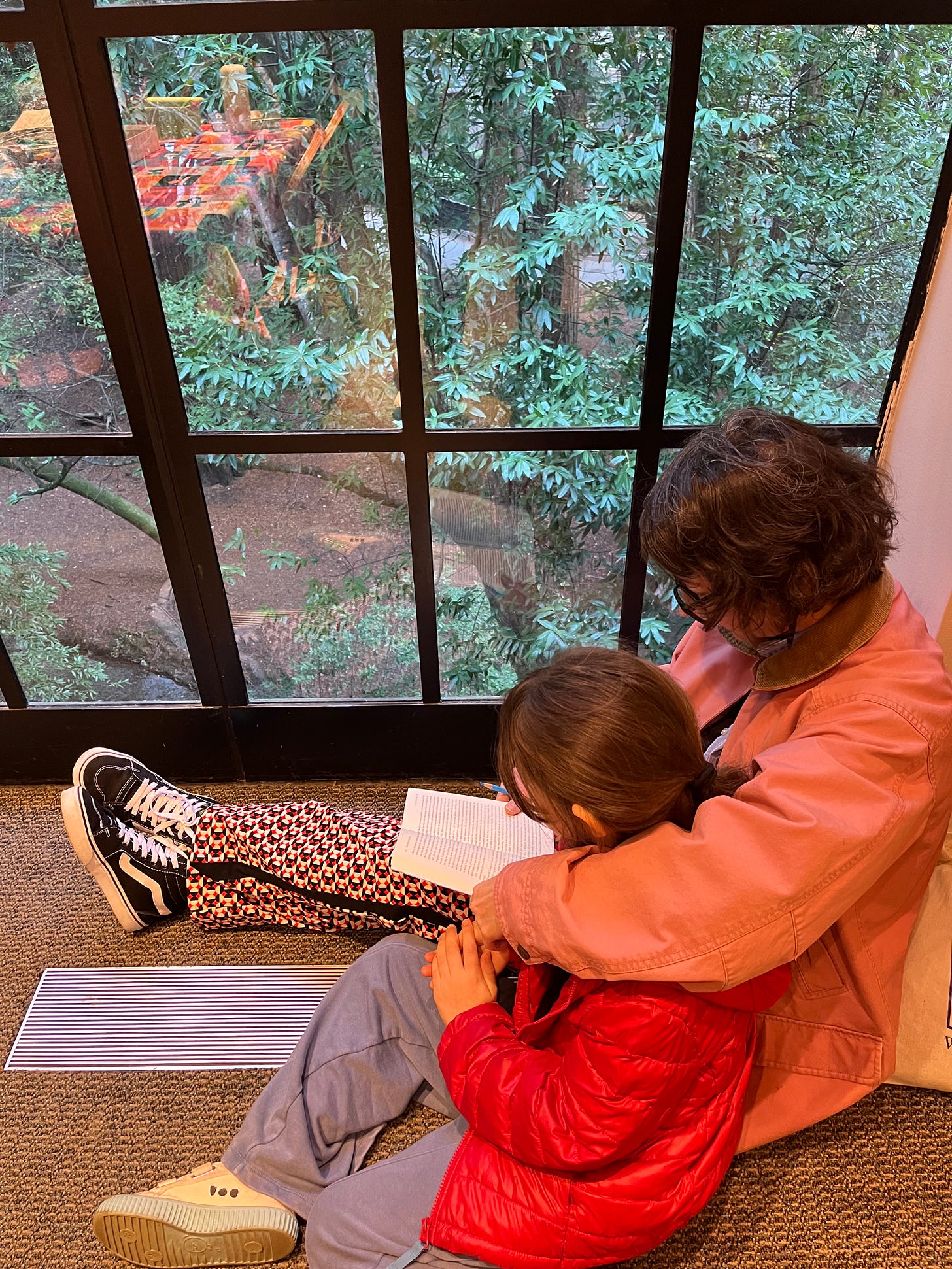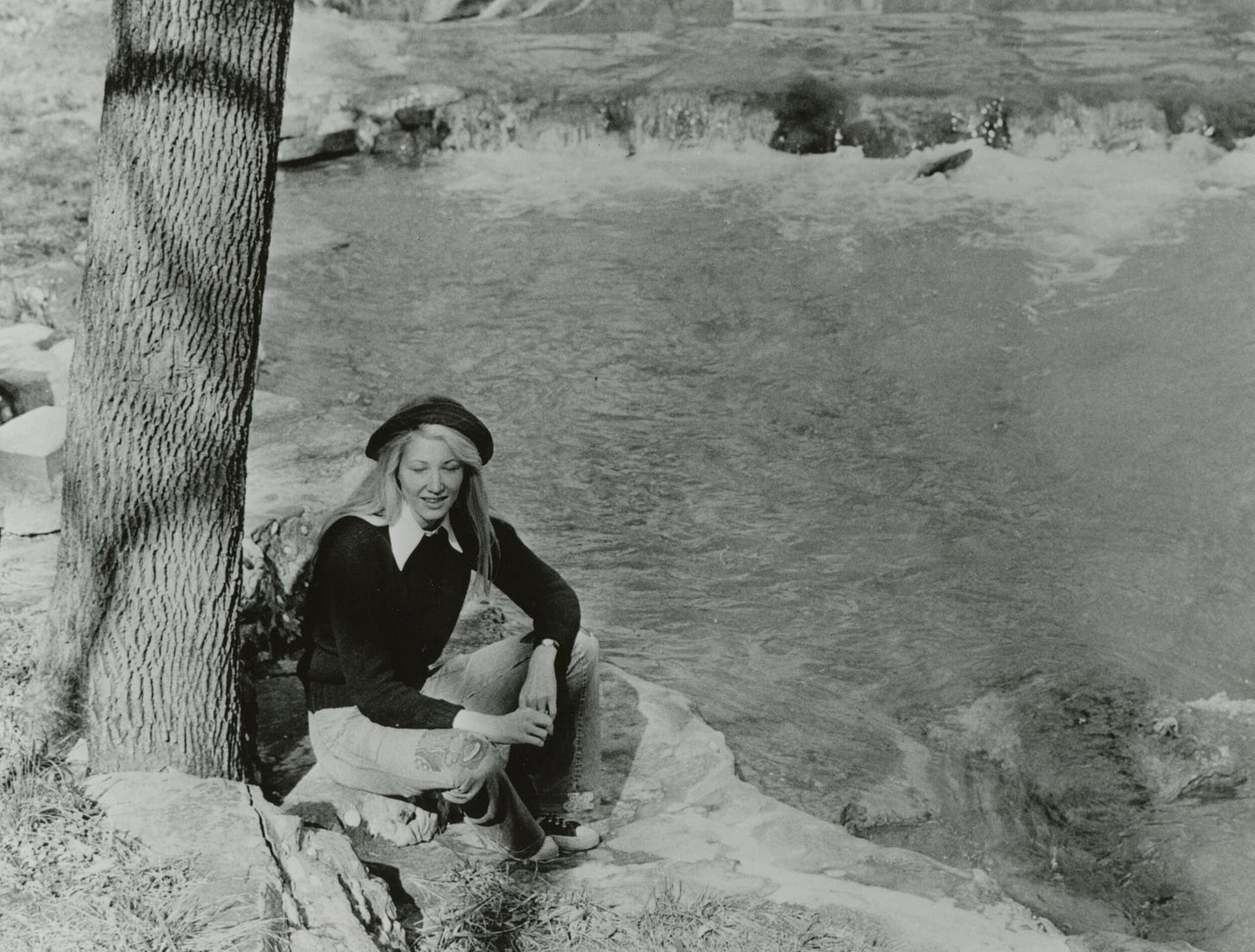Issue 120: Reading carnivorously.
Protecting my reading self
But time is the only thing we have been given, and we have been given to time. Time gives us a whirl. We keep waking from a dream we can't recall, looking around in surprise, and lapsing back, for years on end. All I want to do is stay awake, keep my head up, prop my eyes open, with toothpicks, with trees.”
― Annie Dillard, Pilgrim at Tinker Creek
Just a week ago, I told you I needed to read a little less—so I could be more present with my kid, my partner, with life. And almost immediately, my perfectionism kicked in. If I’m reading less, I reasoned, then every book had better count. Suddenly reading felt like an obligation. A performance review. I started drafting and redrafting lists of what I’d read this month—something I rarely do. Titles added, removed, re-added. As if I were choosing a thesis topic, not books to read after dinner.
I told myself, If I have less time to read, then I should read with intention. Which isn’t a bad goal. But intention morphed into rigidity. Curiosity gave way to curation. Curation became control. And control, predictably, led to anxiety. I really, really do not need reading to become another arena where I aim to excel.
I’m not new to perfectionism, even if it shows up in my reading life in subtle ways: the deliberate sequencing of books, the constant pressure to read what I “should,” the quiet desire to project a particular kind of reading identity—intellectual but not obscure, literary but not self-important, feminist but not doctrinaire. And always, always, the hunger for insight: as if finishing a book without extracting something useful meant I had failed. I have enough self-awareness to notice it when it pops up and I actively push against it. Oftentimes I feel inspired by my ambition, by my willingness to push myself, by my desire to grow. But sometimes, intention is just fear in a better outfit. Anxiety, costumed in literary virtue.
Perfectionism isn’t about high standards. It’s a defense against chaos. Lately I’ve been reading a lot of psychoanalysts, and it’s made something very clear: the perfectionist reader in me isn’t seeking insight—they’re fleeing vulnerability. A perfectly planned reading life, after all, is one that can’t surprise or disappoint. It’s not about excellence. It’s about insulation. Every book becomes a test—of intelligence, seriousness, worth. I stop asking What might this book reveal to me? and start worrying What does my response to this book reveal about me?
The former invites discovery. The latter demands performance.
Beneath all the lists and guilt and unread classics lies the same old fear: of wasting time in a life that only speeds up, of being seen as unserious, of encountering something that might change me in ways I didn’t plan for.
I brought all this to my friend , a psychotherapist. Her response landed like a soft hammer:
I love that you brought this query to me because I need to flesh this out for myself (and will need to promptly do it again in 6–7 months when I forget it entirely). As you said, it’s fulfilling at times to be intentional in our approach to reading—we could even say disciplined—but there’s a great risk if we succumb to the tyranny of the should. What often serves us better is attunement. Can we be responsive to our internal cues? If you feel squirrelly 75 pages into a book you told yourself you ‘had’ to read, pause. Ask, what’s coming up for me? In my experience, I usually know if it’s a spark or a should. Sometimes it’s both. In that case, I say: sit with the should. Then follow the spark.
That’s what I needed. Not more strategy—just permission. Attunement, not abandon. Not indulgence, but a shift inward. Noticing what draws me, repels me, makes me restless or enchanted. Letting that guide me more than any list ever could.
Attunement doesn’t mean discarding intention. It means holding it more loosely. Letting structure be scaffolding, not a cage.
Whenever I feel time-poor, my perfectionism sharpens. If I can’t read everything, I tell myself, then I should only read the best, the most relevant, the most me. But that logic corrodes the very pleasure that makes reading worth doing. A few weeks ago, I wrote about reading kinks—those irrational pulls that shape our reading tastes. They’re worth trusting. They lead to the strange, the surprising, the books that make me feel most alive.
So instead of perfecting my reading life, I’m trying to protect it. To safeguard what matters most: surprise, immersion, disruption, comfort. Reading that changes me not because I worked at it, but because I allowed it to.
Annie Dillard is credited with the idea of reading “carnivorously”—not like a student cramming for a test, but like a creature feeding on something essential. That’s the reader I want to be. Not greedy, but hungry. Not strategic, but alive.
She read books as one would breathe air, to fill up and live.
― Annie Dillard, The Living
This doesn’t mean abandoning structure. It means bending plans toward joy. Toward curiosity. Toward the book I didn’t expect to love, but do1. When I can’t read everything I “should,” I have to ask what I actually want. What sustains me? What feeds me, rather than depletes me? The irony: I get more from reading when I stop trying to prove something. Not because I’m trying harder, but because I’ve stopped trying to be someone else’s idea of “a good reader.” Reading with both intention and abandon. With structure and spontaneity.
Not a perfect reading life. But a wholehearted one.
🤓 Questions for you:
How does perfectionism show up in your reading life?
What helps you distinguish between healthy intention and rigid control?
What reading “shoulds” are you ready to release?
Currently, Dream Count by Chimamanda Ngozi Adichie. , can’t wait to debrief.









I really relate to this. It's funny, the more I read, or get into reading, the more I feel as though I'm not reading enough. It's kind of like, the more you learn, the less you feel like you know?
What a timely post. Just this morning, I was looking at my "books read in 2025" list at the back of my planner and feeling a little shocked at how little was there. But upon reflection, what I've read this year has (mostly) been exactly what I needed to read to nourish myself. I love the idea of "reading carnivorously." I would also recommend my friend Heather White's book, BOOKS PROMISCUOUSLY READ: READING AS A WAY OF LIFE.
P.S. great pic of you and your daughter